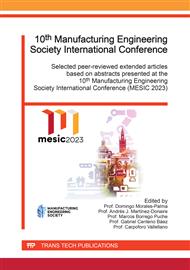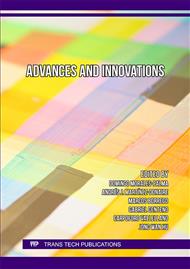[1]
F. Burgada, E. Fages, L. Quiles-Carrillo, D. Lascano, J. Ivorra-Martinez, M.P. Arrieta, and O. Fenollar, Upgrading recycled polypropylene from textile wastes in wood plastic composites with short hemp fiber, Polymers. 13 (2021) 1248.
DOI: 10.3390/polym13081248
Google Scholar
[2]
S. Rojas‐Lema, D. Lascano, J. Ivorra‐Martinez, J. Gomez‐Caturla, R. Balart, and D. Garcia‐Garcia, Manufacturing and Characterization of High‐Density Polyethylene Composites with Active Fillers from Persimmon Peel Flour with Improved Antioxidant Activity and Hydrophobicity, Macromolecular Materials and Engineering. 306 (2021) 2100430.
DOI: 10.1002/mame.202100430
Google Scholar
[3]
A. Agüero, M.d.C. Morcillo, L. Quiles-Carrillo, R. Balart, T. Boronat, D. Lascano, S. Torres-Giner, and O. Fenollar, Study of the influence of the reprocessing cycles on the final properties of polylactide pieces obtained by injection molding, Polymers. 11 (2019) 1908.
DOI: 10.3390/polym11121908
Google Scholar
[4]
D. Lascano, L. Quiles-Carrillo, R. Balart, T. Boronat, and N. Montanes, Toughened poly (lactic acid)—PLA formulations by binary blends with poly (butylene succinate-co-adipate)—PBSA and their shape memory behaviour, Materials. 12 (2019) 622.
DOI: 10.3390/ma12040622
Google Scholar
[5]
Á. Agüero, D. Garcia-Sanoguera, D. Lascano, S. Rojas-Lema, J. Ivorra-Martinez, O. Fenollar, and S. Torres-Giner, Evaluation of different compatibilization strategies to improve the performance of injection-molded green composite pieces made of polylactide reinforced with short flaxseed fibers, Polymers. 12 (2020) 821.
DOI: 10.3390/polym12040821
Google Scholar
[6]
D. Garcia-Garcia, L. Quiles-Carrillo, N. Montanes, V. Fombuena, and R. Balart, Manufacturing and characterization of composite fibreboards with Posidonia oceanica wastes with an environmentally-friendly binder from epoxy resin, Materials. 11 (2017) 35.
DOI: 10.3390/ma11010035
Google Scholar
[7]
M. Przybysz-Romatowska, J. Haponiuk, and K. Formela, Reactive extrusion of biodegradable aliphatic polyesters in the presence of free-radical-initiators: A review, Polymer Degradation and Stability. 182 (2020) 109383.
DOI: 10.1016/j.polymdegradstab.2020.109383
Google Scholar
[8]
A. Agüero, D. Lascano, D. Garcia-Sanoguera, O. Fenollar, and S. Torres-Giner, Valorization of linen processing by-products for the development of injection-molded green composite pieces of polylactide with improved performance, Sustainability. 12 (2020) 652.
DOI: 10.3390/su12020652
Google Scholar
[9]
S. Rojas‐Lema, J. Ivorra‐Martinez, D. Lascano, D. Garcia‐Garcia, and R. Balart, Improved performance of environmentally friendly blends of biobased polyethylene and kraft lignin compatibilized by reactive extrusion with dicumyl peroxide, Macromolecular Materials and Engineering. 306 (2021) 2100196.
DOI: 10.1002/mame.202100196
Google Scholar



